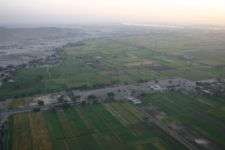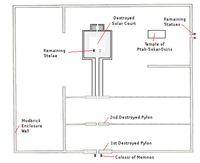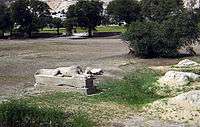Mortuary Temple of Amenhotep III

The Mortuary Temple of Amenhotep III (known in modern times as Kom el-Hettan, Arabic: كم الحيطان) is located in the Theban necropolis, on the west bank of the Nile, opposite Luxor in Egypt. It was built for the Pharaoh Amenhotep III. When constructed it was the largest of the mortuary temples in the Theban area, larger than the complex at Karnak, and covered an area of 350,000 square metres.
Today very little remains of the complex, with only the Colossi of Memnon – two massive 18-metre stone statues of Amenhotep that stood at the gateway, still visible. It was constructed closer to the river than any of the other mortuary temples, and hence decayed quicker, and it was used in ancient times as a source of construction material. A granite stele of Amenhotep can be found in the temple of Merenptah, which is located about 100 metres to the north.
The site has been included in the World Monuments Watch list of endangered sites by the World Monuments Fund (WMF) in 1998 and 2004, and has received funding from the organization and from American Express.[1]
Temple layout


The temple faced to the east, facing the Nile and this was guarded by the two Colossi of Memnon. Two large courts and three mudbrick large pylons then led to the solar court. These open courts have further seated statues of Amenhotep III, at least one sphinx statue of Queen Tiye (which is now headless), jackal statues and Osirid statues of the king. Another sphinx with the body of a crocodile (again headless) has been found – this can still be seen today from the road that runs by the temple.
Solar court
A procession of sphinxes continues from the third pylon towards the solar court. This was surrounded by sandstone papyrus columns and further Osirid statues of Amenhotep III. These statues had lists of captives from foreign lands. At the south side of the entrance to the solar court a massive stela was found and has been re-erected, this shows the king with Queen Tiye and the god Ptah–Sokar–Osiris, with further texts describing the building accomplishments of the king.
Current excavations
As of 2004 archaeological excavations are under way in the temple.
See also
- Colossal quartzite statue of Amenhotep III Found at the Mortuary Temple
- Medinet Habu (Mortuary Temple of Ramesses III)
- Colossi of Memnon, two massive statues built nearby
References
External links
| ||||||||||||||||||||
Coordinates: 25°43′16″N 32°36′36″E / 25.721°N 32.610°E
